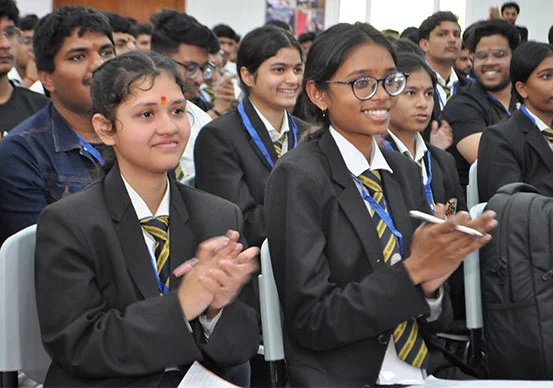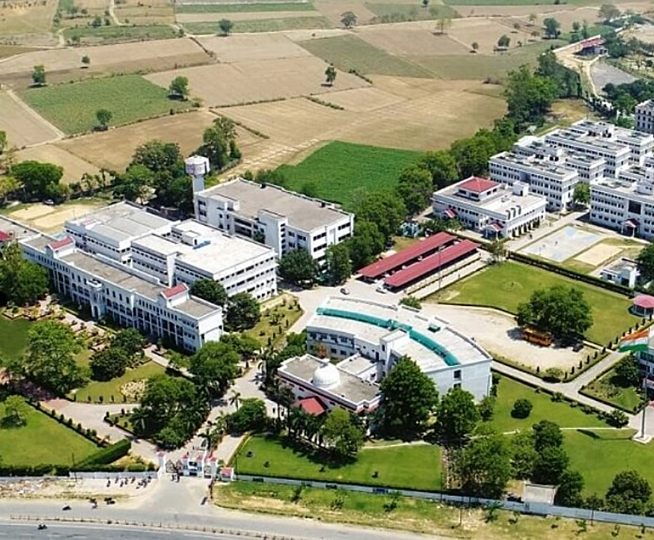
BMLT (Bachelor in Medical Lab Technology)
Duration
3 year + 6 months internship
Eligibility Criteria
B.Sc. in Medical Lab Technology (3 Years + 6 Months Internship )
Passed 10+2 examination with 50% marks in aggregate with Physics, Chemistry and Biology as mandatory subjects.
Secured 50% marks in PCB and should have pass in English as subject.
The field of Medical Laboratory Technology offers a rigorous 3.5-year professional course to train professionals in specimen examination, meticulous documentation, and disease diagnosis.
Clinical laboratory tests cover microscopic examinations, immunoassays, genetic testing, biochemistry, and the analysis of bodily fluids, tissues, and cells. These tests are essential for assessing patient health, aiding in diagnosis, treatment, monitoring, and disease prevention.
The B.Sc. in Medical Laboratory Technology provides comprehensive education and training in various disciplines, including Phlebotomy, Microbiology (Bacteriology, Virology, Immunology, Serology, Parasitology, Mycology), Hematology, Histopathology, Cytopathology, Clinical Biochemistry, and Blood Banking. Graduates gain the knowledge and skills needed to excel in diverse healthcare settings, significantly contributing to patient care and medical research.
Apply NowAdmissions 2024
Find your path to Success
Curriculum
-
Human Anatomy-I
-
Human Physiology-I
-
Basic Hematology & Clinical Pathology-I
-
Fundamentals of Biochemistry-I
-
Preventive Medicine &Community Healthcare
-
Fundamentals of Microbiology-I
-
English communication-I
-
Human Anatomy-II
-
Human Physiology-II
-
Basic Hematology &Clinical Pathology-II
-
Fundamentals of Biochemistry-II
-
MS excel for analysis and
-
Teamwork and analytical
-
Fundamentals of Microbiology-II
-
English Communication- II
-
Clinical Hematology- I
-
Clinical Biochemistry-I
-
Clinical Microbiology-I
-
Immunology & Serology-I
-
Histopathology & Histo techniques–I
-
Environmental Sciences
-
Clinical Hematology-II
-
Clinical Biochemistry-II
-
Clinical Microbiology-II
-
Immunology & Serology-II
-
Histopathology & Histo techniques– II
-
General pathology
-
Environmental manage & sustainable development I
-
Immuno hematology &Blood Banking
-
Clinical Enzymology & Automation
-
Medical Microbiology-I
-
Parasitology
-
Diagnostic Cytology
-
Principles of Laboratory Management
-
Environmental manage &sustainable development II
-
Clinical Endocrinology & Toxicology
-
Medical Microbiology-II
-
Clinical Virology
-
Basic Biostatistics & Research Methodology
-
Diagnostic Molecular Biology
Career Path
Thriving careers await BMLT graduates in the growing healthcare industry: hospitals, research institutions, diagnostic labs, and beyond, with opportunities for advancement and specialization.
- Medical Laboratory Technologist
- Laboratory Manager
- Quality Control Analyst
- Research Assistant
- Technical Sales Representative
- Healthcare Educator

Program Educational Objectives PEOS
-
PEO1
Graduates will demonstrate proficiency in conducting laboratory tests and procedures, adhering to quality standards and regulatory requirements to support accurate diagnosis and effective patient care.
-
PEO2
Graduates will exhibit professional ethics, communicate effectively with healthcare teams and patients, and contribute to a collaborative healthcare environment, ensuring the delivery of comprehensive and compassionate care.
-
PEO3
Graduates will engage in continuous professional development and stay abreast of advancements in medical laboratory science and technology, adapting to evolving healthcare practices and innovations.
Program Outcomes PO’s
BMLT (Bachelor of Medical Laboratory Technology), is a program that trains students in various aspects of medical laboratory science. Some common outcomes of a BMLT program may include:
-
PO1
Knowledge and Skills : Graduates should possess a solid understanding of medical laboratory science principles, techniques, and procedures. They should be skilled in conducting laboratory tests, analyzing samples, and interpreting results accurately.
-
PO2
Laboratory Techniques : Students should be proficient in using a wide range of laboratory equipment, instruments, and technologies commonly used in medical laboratories. This includes knowledge of specimen collection, handling, and processing techniques.
-
PO3
Diagnostic Ability : Graduates should have the ability to correlate laboratory findings with patient information to assist in the diagnosis, treatment, and monitoring of diseases. They should be capable of identifying abnormal test results and recognizing potential errors or discrepancies.
-
PO4
Quality Assurance :BMLT graduates should understand the importance of quality assurance and quality control measures in the laboratory. They should be familiar with standard operating procedures, safety protocols, and regulatory requirements to ensure accurate and reliable test results.
-
PO5
Communication and collaboration : Effective communication skills, both verbal and written, are essential in a medical laboratory setting. BMLT graduates should be able to communicate test results and findings to healthcare professionals and interact with patients when necessary. They should also understand the importance of teamwork and collaboration within a multidisciplinary healthcare environment.
-
PO6
Professionalism and ethics : BMLT programs emphasize the importance of professional conduct and ethical behavior in medical laboratory practice. Graduates should demonstrate an elevated level of integrity, confidentiality, and respect for patient rights and privacy.
-
PO7
Practice skills development : Laboratory courses aim to develop students’ practical skills related to the subject matter. This may include techniques such as conducting experiments, using laboratory equipment, data collection, and analysis.
-
PO8
Application of theoretical concepts : The laboratory setting allows students to apply the theoretical concepts learned in lectures or textbooks. They can observe how these concepts are put into practice, which enhances their understanding and reinforces theoretical knowledge.
-
PO9
Experimental design and execution : Students learn how to design and execute experiments, including formulating research questions, planning procedures, identifying variables, and collecting data. This helps them develop critical thinking and problem-solving skills.
-
PO10
Data analysis and interpretation : Laboratory courses often involve analyzing and interpreting experimental data. Students learn how to analyze data using appropriate statistical methods, draw conclusions, and present their findings effectively.
-
PO11
Collaboration and teamwork : Laboratory courses often require students to work in teams or groups. This fosters collaboration, communication, and teamwork skills, as students learn to coordinate efforts, share responsibilities, and solve problems together.
-
PO12
Safety protocols and ethical considerations : Laboratory courses emphasize the importance of safety protocols and ethical considerations in conducting experiments. Students learn how to handle hazardous materials, follow safety guidelines, and consider the ethical implications of their research.
-
PO13
Documentation and reporting : Laboratory work involves documenting procedures, observations, and results accurately. Students learn how to maintain a laboratory notebook. Draft scientific reports and communicate their findings in a clear and organized manner.
Program Specific Outcome PSOs
-
PSO1
Students will possess a solid foundation in laboratory techniques, including specimen collection, handling, and analysis across various disciplines such as Pathology, clinical biochemistry, Microbiology, Immunology, and molecular diagnosis.
-
PSO2
The students will be familiar with a wide range of laboratory instruments, equipment, and technologies commonly used in clinical diagnosis.
-
PSO3
Students will be knowledgeable about quality control measures, quality assurance programs, and regulatory guidelines to maintain accuracy and precision in laboratory testing.
FAQ
Graduates of the Bachelor of Medical Laboratory Technology (BMLT) program have various career opportunities in healthcare settings such as hospitals, clinics, diagnostic laboratories, and research institutes. Some of the job roles they can take up include medical laboratory technologist, lab manager, lab supervisor, research technician, and academician. They can also pursue higher education such as a master’s degree in medical laboratory technology or related fields, or pursue research opportunities in the field.
Yes, in India, Bachelor of Medical Laboratory Technology (BMLT) graduates are required to be licensed by the respective state medical councils to practice as medical laboratory professionals. Furthermore, graduates are required to pass the qualifying examination conducted by the respective state medical councils in order to obtain a license to practice as medical laboratory professionals.
A Bachelor of Medical Laboratory Technology (BMLT)) program typically covers subjects such as Human Anatomy, Human Physiology, Biochemistry, Immunology, Human Psychology, Serology. Students also receive training in laboratory techniques, instrumentation, quality control, safety procedures, and data analysis.
Bachelor of Medical Laboratory Technology (BMLT) graduates are in high demand in the healthcare industry due to their critical role in conducting laboratory tests and analyses. The demand for BMLT graduates is expected to continue to grow in the coming years, creating numerous job opportunities in the field.








